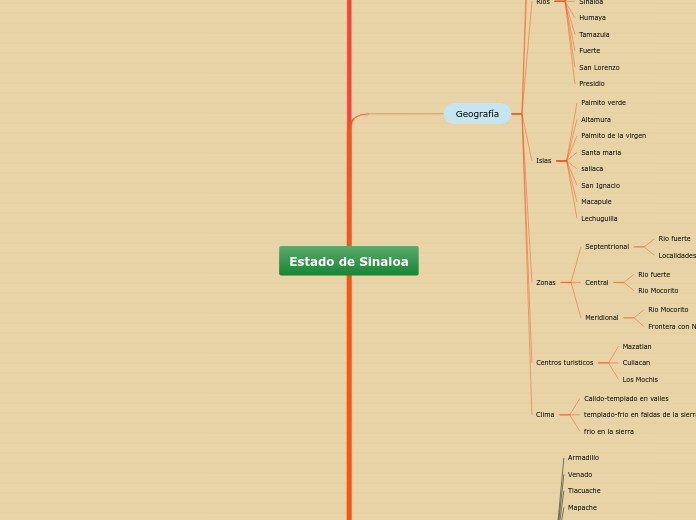von Jose Limon Vor 4 Jahren
819
Estado de Sinaloa
Sinaloa, un estado ubicado al noroeste de México, es notable por su rica diversidad natural y cultural. La flora incluye una variedad de árboles y plantas como ceiba, guamúchil, y mezquite.

von Jose Limon Vor 4 Jahren
819

Mehr dazu

To name your story, you have to think about the overall message and what you want your audience to understand from the story. Also, make it relevant and easy to remember.
The ending of a story is essential. We all know that if the ending is weak, what happened before loses its importance. So make it unpredictable, but fair. A resolved ending answers all the questions and ties up any loose threads from the plot.
Caracoles, Almeja, Ostion
Sardina, Pez sierra, gaviotas, pelicanos
Corvina, Robalo, Pargo, Mojarra, Lisa
Jaiba, pulpo, focas, lobos marinos, rana
Camaron, albatros, lobina, bagre, tipia, mojarrq
The middle of the story is where you add layers of complications that will lead to the end. Reveal more about the character's journey. Did their personality go through changes? How did they overcome the challenges? And as you build up the story’s central conflict, make it more personal to that character. Also, from the middle act, you have to lead into the final act.
Frontera con Nayarit
Rio Mocorito
Localidades de Esperanza y Topolobampo
Rio fuerte
There wouldn't be any tension and excitement in your story if there weren't any obstacles in your character's way.
Durango
Nayarit
Océano Pacifico
Golfo de california
Sonora
Chihuahua
Each story has a main character and that character usually needs to solve a problem or challenge. The character's challenge is the one that creates tension throughout the story.
In the beginning of the story (or the exposition), you will need to introduce the setting and characters. You might also want to introduce the main conflict. This part of the story is important because it gives the reader necessary background information and maybe even a first insight into a character’s personality.
lo define como "voz hibrida, tarasca-cahita-nahualt" sinaro-a, compuesta de "sina" semillero de pitahayas o fruto de mil semillas
Define el nombre de Sinaloa como "Pitahaya Redonda"
de ahí se crea una gran fusión de cocinas que se refleja en la gastronomía del estado.
The setting (time & place) of a story can change throughout the plot.
Sensory details include sight, sound, touch, smell, and taste. These details are important because they create depth in your setting.
See a few examples below:
Your story can take place wherever your imagination will take you to.
For example: in an elevator, in an enchanted forest, etc. Don't forget to give details of the environment each time the setting changes, otherwise, the story can be confusing. Also, mention the seasons as each of them has unique weather and events.
Characters are essential to a good story. Usually, the protagonist(s) is/are the most affected by the plot. Introduce a character by focusing on their actions, interests, and occupation, as the physical appearance doesn't make a difference in most cases.
Guasaves
Sinaloas
Achire
Zona colindante con Durango
Zona serrana de Culiacan
What is your character's main goal?
Franja costera hasta los limites con Nayarit
Zona central costera hasta las riberas del rio Piaxtla
Zona de los ríos Mayo y Fuerte
Type in the name of your character.